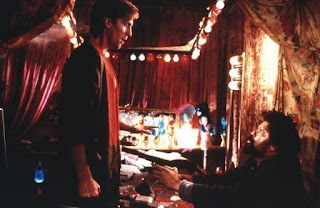I just finally caught up with John Frankenheimer's sleazy 1986 Cannon actioner 52 Pick-Up., based on Elmore Leonard's novel (2 years earlier filmed by Cannon as the Robert Mitchum vehicle The Ambassador). I'm a big Roy Scheider fan as longtime readers of this site likely know, but it was John Glover as central villain Alan Raimy who blew me away in terms of performance and overall impact. A native of Salisbury, Maryland, Glover ingeniously utilizes the Baltimore dialect, or "Balmorese," which makes his smart, twisted, and funny crook all the more memorable and unique in the cinematic pantheon of criminal masterminds. A close relative of the Philadelphia dialect, Balmorese, like the Philly variation, is rarely heard on film or television, probably because it's much more difficult for outsiders to approximate than the New York dialect, for instance.
In the Rocky films, for example, all of the primary characters are lifelong Philadelphians, as far as the script tells us, yet are voiced with New York dialects. On The Wire, McNulty, a died in the wool blue- collar Baltimorean, is played by Dominic West, he of a posh British background, who does not even attempt Balmorese, but rather speaks in that terribly boring "non-accent" that so many Brits playing Americans resort to. Love the show, but its verisimilitude is severely compromised, in my estimation, by not casting someone actually from the area. It's not quite the same as casting whites as Native Americans or Latinos, as was so often the practice in studio-era Hollywood, but for a show that was so much about the place and what it meant to grow up and live there, it's still a head-scratcher to me as to why you would cast the ostensible central part with an upper class Briton.
Anyway, back to Glover and 52 Pick-Up...he's such an interesting performer and the character so intrinsically theatrical that his use of the accent--too often an over-abused, actorly tool--is justified and it elevates the performance into a strata of over-the-topness that is completely appropriate for the material. It also overshadows Scheider in the lead role. I'm not sure if this could have been avoided even if Scheider had brought his usual intensity to the role or if the part were better written. As it stands, Scheider seems a little detached and routine here and his character's transformation from a philandering white-collar factory owner to a tough, underworld-savvy avenger isn't very convincing.
In addition to Scheider's limpness here, composer Gary Chang's synth-based score is sometimes effective, though it repeatedly sounds like a cheaper copy of Arthur B. Rubinstein's Blue Thunder music (probably what the filmmakers used as the temp track) and when it's bad and ineffective, it's very bad and wildly inappropriate, as is the case with the dopily cheerful end credit music. This ill-fitting track plays in the aftermath of a violent climax, which will be quite familiar to viewers of Michael Winner's The Mechanic, where said ending is much less telegraphed than it is here. Additionally, Winner's 1972 film plays without any music over its credits, a choice which says a lot about the differences between American films of the late '60s to mid-'70s, even mainstream genre pieces such as The Mechanic, and the slicker, more homogenized product that had taken hold by the mid-'80s. Frankenheimer's film is far from happy at the end, calling for something a little downbeat in terms of music; instead we get this slab of horribly-aged synth cheese (please excuse the bad pun, but I think you'll agree):
Glover, as they say, kills it in 52 Pick-Up, and Clarence Williams III, as one of his cohorts, is right behind him, as a lethal man of few words, but revealing glances. Robert Trebor, as the other member of this criminal troika, has had a long and distinguished stage career, as has Glover, but his annoying, sweaty theatrical flourishes just serve to underscore that he is an actor playing at being a low-life strip club owner and amateur extortionist. So, the film provides a sort of acting workshop in action, wherein we see the low-key, less-is-more approach working extremely well (Williams) and not so well (Scheider) and the larger-than-life, big performance failing (Trebor) and succeeding (Glover).
In the what-might-have-been category, Glover was almost or originally cast as Kreese in The Karate Kid, which you can witness in this video, part of a fascinating collection of rehearsal tapes that John Avildsen has uploaded to his YouTube account. The below video comes from a cast read through at producer Jerry Weintraub's home. Whether Glover was just meant to stand in before a final performer (Martin Kove) was found, or whether he quit or was fired is not clear. Avildsen is cheeky in the comments section when asked who the actor playing Kreese is, but it sure looks and sounds like Glover, who surely would have brought a different brand of cartoon performance (which the character demands) than did the stone-faced Kove:
























































